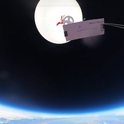The words of a nonagenarian may never have been so eagerly awaited as those of James Lovelock when he addressed a Royal Society dinner earlier this month. Lovelock, creator of the controversial Gaia hypothesis, is certainly still capable of original thinking, and it was his verdict on recent environmental controversies—such as the leaked emails from the University of East Anglia—that his audience wanted to hear.
The Gaia hypothesis, which made Lovelock the darling of the emerging green movement of the 1960s, proposes that life on earth is closely coupled with the surface, ocean and atmosphere. Each element co-operates to keep conditions relatively constant—at least in the absence of exceptional external forces. Initially, he was ridiculed: the idea that inanimate objects such as rocks are active participants in a super-organism was understandably controversial, and rejected by most scientists. But the idea that life exerts a strong influence on the environment has come to be widely accepted.
Perhaps unsurprisingly, Lovelock has tended to be at the apocalyptic end of the climate change spectrum. He predicted in 2006 that average temperatures would rise by 8°C in temperate regions by the end of the 21st century, leading to billions of deaths and leaving only the polar regions habitable. In spite of this, though, he has never had much respect for green orthodoxy. In 2004 he shocked many of his disciples when he argued that nuclear power was the only realistic way to mitigate the impending ecological disaster. (Some cynics suggested that this was because he heard of plans for a wind farm which would spoil the view from his home.) He recently and rightly slated Ed Milliband, secretary of state for energy and climate change, for his ludicrous assertion that "opposition to wind farms should be as unacceptable as failing to wear a seatbelt," describing this as political or environmental correctness veering towards fascism. He has also retreated considerably from his extreme position of 2006, just as he earlier disassociated himself from some of the weirder extensions of the Gaia hypothesis, like the idea that the Earth as a whole is part of a universal consciousness.
So when he stood up to speak at the Royal Society, nobody could be sure what he would say. Still, he surprised many in his audience by the apparent extent of his revisionism, describing climate sceptics as a “breath of fresh air” for exposing the flaws in current global forecasting models. Lovelock’s central point was that climate change models are not yet fit to make predictions even 40 years ahead. His position that continued release of carbon into the atmosphere constitutes a grave threat was unaltered, but he seemed to concede that the changes might not be as severe or rapid as he had earlier predicted.
It could be argued that Lovelock was over-hasty with his predictions of near extinction, but instead we should take heart that, almost half a century after developing his original hypothesis, he is still willing and capable of modifying his views on the basis of evidence. It is a good example not just for many younger scientists, but to everyone. On another level, it will perhaps raise hopes that some form of climate consensus can emerge out of the recent controversies. What we desperately need now is a more balanced and sustainable long-term energy strategy.
James Lovelock is an example to every scientist
March 18, 2010

James Lovelock: not afraid to admit he's been wrong











